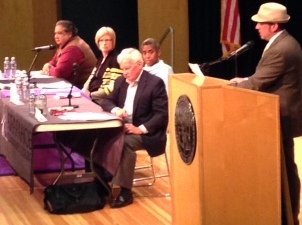Veteran journalists discuss coverage of race in America at ACC

Image via Bob Burdick
Francisco Miraval (l), Joanna Bean, Donna Bryson, Ed Otte and Jamey Trotter
Four veteran Colorado journalists who visited ACC last Spring agreed on one thing, at least, about covering race in America: It isn’t easy.
It’s a matter of perception, as well as accuracy, they said.
Most people who read and watch the news find something to criticize in coverage relating to race, they said. Though most readers and viewers say they want straight-down-the-middle coverage, many actually want biased coverage — as long as it’s biased their way.
One issue is that many people develop their opinions by talking to friends, said Donna Bryson, a panelist and a former correspondent in South Africa for The Associated Press. “Friends end up reinforcing what you think,” she said. Her advice: “Get outside the comfort zone.”
The panel, invited by ACC’s Journalism Department and JOU 105 and JOU 106 classes, represented a broad background, including international coverage.
The panelists were:
• Francisco Miraval is an adjunct instructor of Journalism and member of the Journalism Advisory Board at ACC. He began his career in his native Argentina. After coming to the United States, he founded Project Vision 21, which supplies stories in English and Spanish to local and regional outlets. He also has additional journalism experience.
• Joanna Bean is the highest ranking female print journalist in Colorado. She is editor and vice president / content of The Gazette of Colorado Springs, the state’s second-largest newspaper. A Colorado resident since 1975, she has been a journalist for The Gazette for about 25 years. Bean, a Colorado State University graduate, was the lead editor of The Gazette’s 2014 Pulitzer-Prize winning series, written by Dave Phillips (who now is at The New York Times).
• Bryson works for The Associated Press and is a freelance writer. While an AP chief of bureau in South
Africa, she covered the first election in that formerly segregated nation in which blacks were allowed to vote with whites. Bryson, who also worked for the AP in India and the United Kingdom, is the author of a book based on her days in South Africa: “It’s a Black White Thing” She now is based in Denver.
• Ed Otte, who chaired and participated in the panel, is president of the Colorado Pro Chapter of the Society of Professional Journalists, which co-sponsored the session. Otte, former editor of the Greeley Tribune, was executive director of the Colorado Press Association for nearly two decades.
The panelists at the April 2 event were introduced by Jamey Trotter, coordinator of ACC’s Journalism Department.

The panelists noted the substantial role social media had – for better or worse – in covering recent race relations stories. In addition to on-the-scene facts, much on-the-scene erroneous information also was spread via Facebook, Twitter and elsewhere.
Even so, Bryson said, the alternative is not good either. “The more information, the better,” she said. “Citizen journalism is important. I have been to countries where media is controlled, and this is better this way.”
Bean agreed, but pointed out, “…people feel journalism or information is their right. They feel entitled and want information for nothing and they want the information now.” Consumers’ desire for immediacy spawns and supports citizen journalism that challenges mainstream media in reporting accurately and fairly, she said.
Otte, the moderator, asked panelists whether media coverage of race relations has brought about social change.
“The country is dealing with the same topic five generations later, only the mindset and the platform is different,” Miraval said.
Miraval was alluding to the various platforms available for public use that can create grief for the professional journalists.
All agreed that talking about the news coverage, as well as the social media reports, is a good thing.
And all agreed that the free flow of information is important, provided it is accurate and free of bias. That’s the catch with some social media postings, where little if any training is involved and equally little if any effort is made to verify assertions in some cases.
Bean said a key difference between professional journalism sites and some of the others is precisely that effort – to verify assertions, even if it takes longer. “Professional journalists do due diligence and use judgment and discretion,” she said.
“Context may be biased and may not accurately reflect what is happening because of a vested interest in amplifying or diminishing the situation,” Bean said.
Bryson agreed. “It is the journalist’s job to ask questions, not make judgments,” she said. “This is where professional journalism differs from the cavalier citizen journalist reporting from myriad platforms.”


